OVERWATERING A LAWN
What are the Symptoms of a Lawn That is Being Overwatered?
Why Are So Many Lawns Overwatered?
Stop Listening to the “So Called Experts”
Homeowners often feel overwhelmed by varying advice on this subject, but the best course of action is to disregard input from the following sources: the lawn mower guy, your irrigation specialist, the master gardener friend, your landscaper, neighbors, and chemical lawn care companies. While they may mean well, they lack the expertise necessary to guide you effectively on what an organic lawn needs. Setting up a sprinkler system and determining the most effective way to water your lawn is crucial for successful organic lawn care.
Overwatering is Worse the Underwatering
One of the most common mistakes homeowners make is overwatering their lawns. This is far more detrimental than underwatering a lawn because overwatering creates anaerobic conditions in the soil, meaning it deprives it of oxygen. When water replaces air in the soil, it can lead to compaction, hindering deep root growth and harming beneficial microbial activity.
Learn the 1-2-3-2-1 Technique
To achieve optimal lawn health, adopt the 1-2-3-2-1 watering technique. This method ensures deep watering while allowing the soil to dry out completely before the next cycle begins. Developed by Organo-Lawn, specifically for the unique climate of Boulder and Fort Collins, Colorado, this universally applicable technique will help you maintain a vibrant, healthy lawn.
PopUp Sprinkler Head
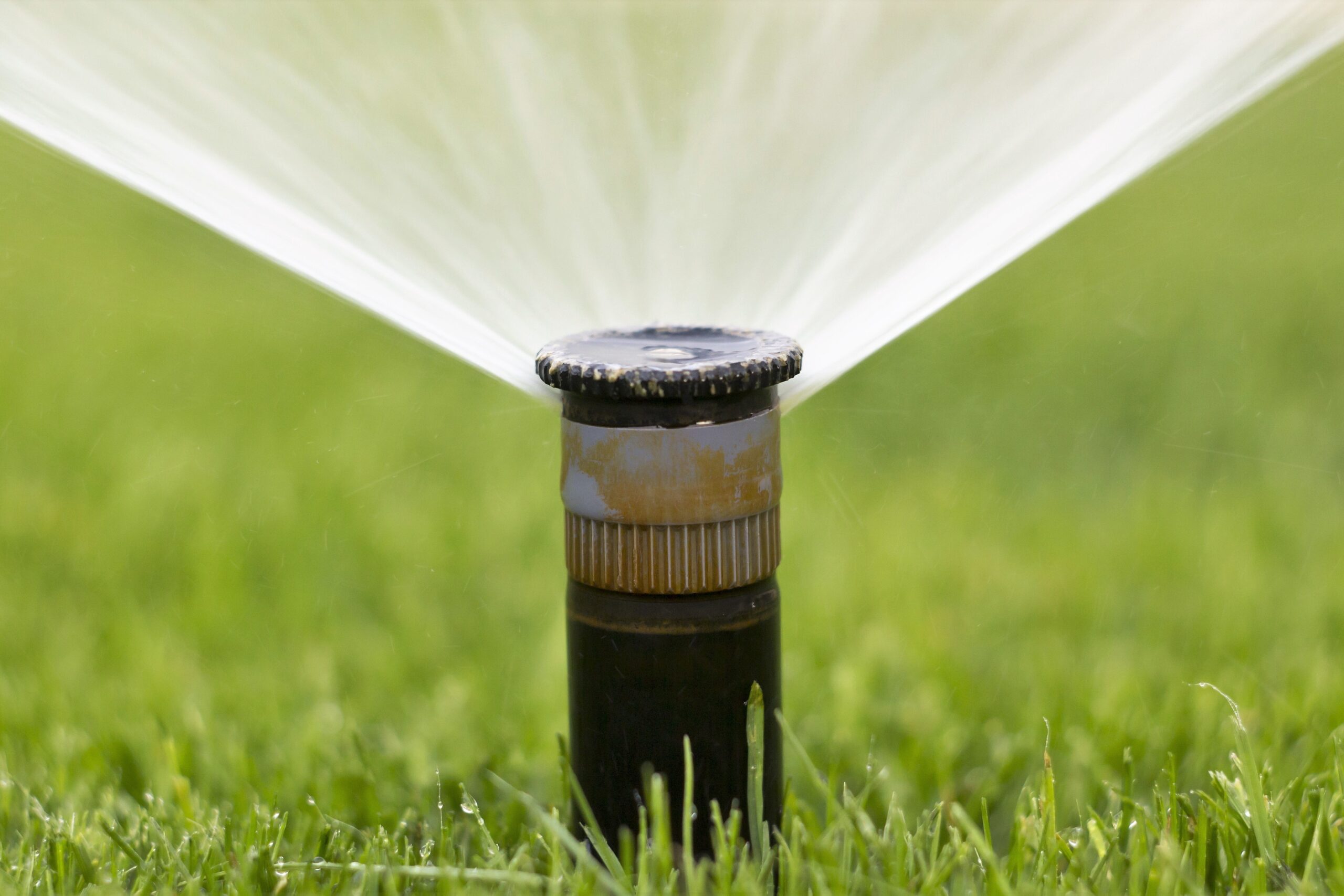
Which Lawn Diseases are Caused by Overwatering?
Necrotic Ring Spot
Brown Patch
Too Much Shade
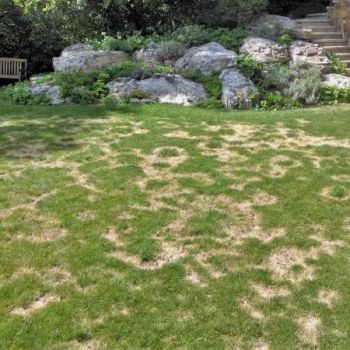
This is a picture of Necrotic Ring Spot Fungus which is caused by severe over watering of the lawn for a long period of time.
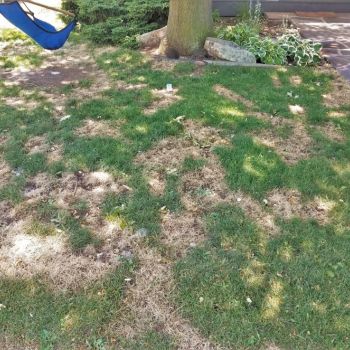
Brown Patch is a grass disease that is caused by severe over watering of a lawn and is usually found in extreme shade areas.
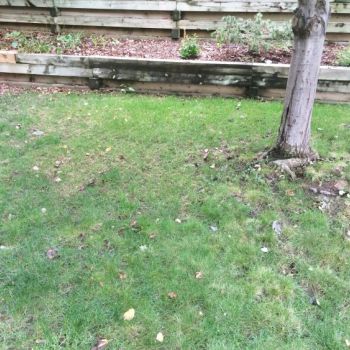
It is very common to see compacted soils underneath shade trees. Over watering a lawn causes soil compaction.
Which is Worse for a Lawn?
Overwatering or Underwatering
Overwatering Symptoms
Overwatering a lawn can be damaging for several reasons, as it disrupts the natural balance and health of the grass and soil. Here’s why overwatering is so harmful!
Soil Compaction
Overwatering causes severe compaction of the soil, reducing its ability to retain nutrients and support healthy grass growth.
Weak and Shallow Root Systems:
When a lawn is overwatered, the grass roots remain near the surface, as they don’t need to search deep for water. Shallow roots make the lawn more susceptible to drought, heat, and other stressors.
Root Rot
Excess moisture can suffocate roots, causing them to rot and die. Fungal diseases like Necrotic Ring Spot and Brown Patch thrive in soggy soil, further damaging the root system.
Thatch and Soil Compaction
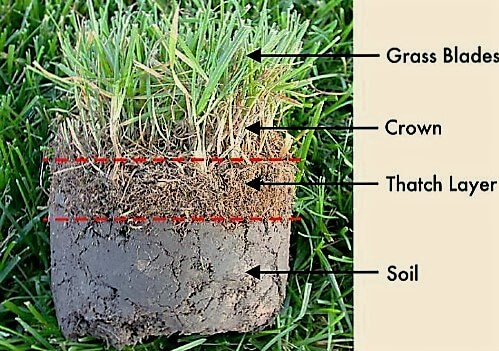
Nutrient Leaching
Overwatering washes away essential nutrients like nitrogen, potassium, and phosphorus from the soil, leaving grass undernourished.
Increased Susceptibility to Diseases
Fungal Infections: Many lawn diseases, like mold, mildew, and fungi (e.g., brown patch or necrotic ring spot), thrive in overly moist conditions.
Pest Infestations: Pests such as mosquitoes and grubs are more likely to infest a waterlogged lawn.
Oxygen Deprived Soils
Overwatered soil becomes waterlogged, reducing the amount of oxygen available to roots. Grass needs oxygen to absorb nutrients, sustain beneficial microbial populations, and grow properly. Without proper aeration, thatch buildup becomes a problem. The lack of decomposition in waterlogged soil can lead to excessive thatch, a layer of dead grass that suffocates the lawn.
Necrotic Ring Spot is a Symptom of an Overwatered Lawn
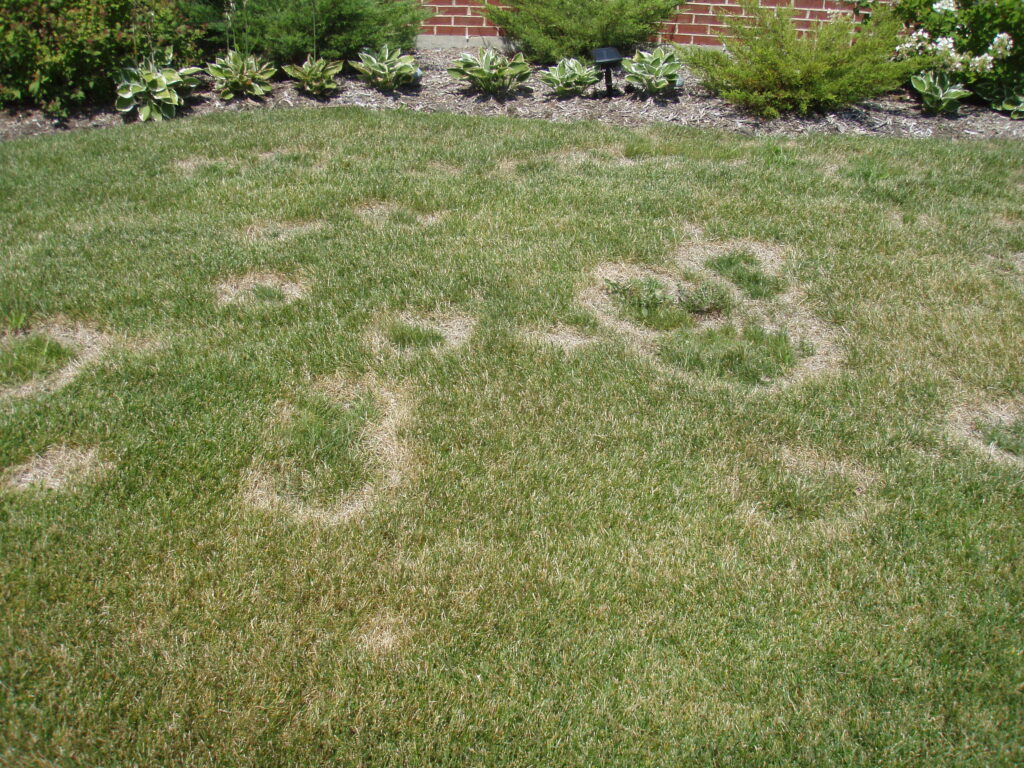
Overwatering Encourages Certain Types of Weeds
Weeds like crabgrass, plantain, and sedges thrive in wet conditions. Overwatering gives these weeds a competitive advantage over grass.
Wasted Resources
Overwatering wastes water, which is particularly problematic in areas prone to drought or with water restrictions.
Runoff and Pollution
Excess water often runs off into storm drains, carrying fertilizers and pesticides that can pollute waterways.
Poor Lawn Aesthetics / Discoloration
Waterlogged grass can turn yellow or brown due to lack of oxygen and nutrients. Overwatering can leave the lawn feeling mushy and muddy, making it unusable for activities.
To avoid these issues, lawns should be watered deeply but infrequently, allowing the soil to dry out between watering sessions. The 1-2-3-2-1 lawn watering technique is programmed to prevent overwatering of a lawn. This technique also promotes healthy root growth and helps maintain a balanced, vibrant lawn.
Plantain is a Clear Sign of Overwatering
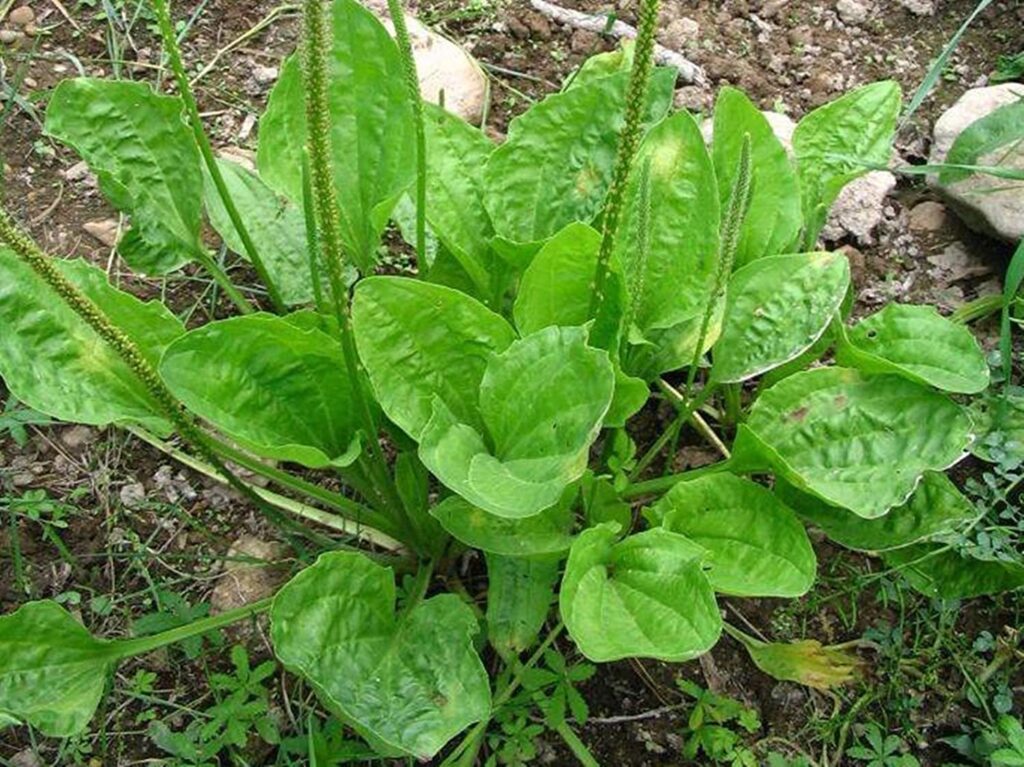
Need Help Setting Up Your Sprinkler System?
(303) 499-2000 Boulder or (970) 225-9425 Fort Collins.
Symptoms of Overwatering a Lawn FAQs
Which is Worse for a Lawn, Underwatering or Overwatering?
Both underwatering and overwatering are harmful to a lawn, but overwatering is often considered worse due to the long-term damage it can cause to the soil, and ecosystem. Here’s a breakdown of the impacts of each to help you understand why overwatering can be more detrimental:
Effects of Overwatering a Lawn
Root Rot and Weak Roots
- Waterlogged soil suffocates roots by depriving them of oxygen, leading to root rot and weak root systems.
- Grass becomes highly dependent on constant moisture and struggles when water levels fluctuate.
Fungal Diseases
- Overwatering creates damp conditions that encourage fungal infections, mold, and other diseases.
- Common diseases include brown patch, pythium blight, and leaf spot.
Nutrient Loss
- Excess water leaches nutrients from the soil, leaving the grass undernourished.
- Leads to yellowing, stunted growth, and poor lawn health.
Compacted Soil
- Persistent overwatering compacts the soil, reducing its aeration and ability to retain nutrients effectively.
Encourages Weeds and Pests
- Overwatered lawns are a magnet for invasive weeds (like crabgrass) and pests (like grubs and mosquitoes).
Damages the Soil
- Water replaces air in the soil and without air the microbial population will quickly die. Rebuilding the soil will take months if not years to reestablish a thriving microbiome.
Additional Lawn Watering FAQs
Water Turns On, Pauses Watering, Soaks Into the Soil, Then Water Starts Again
Setting up a sprinkler controller for a soak cycle involves programming it to water your lawn in shorter bursts with pauses in between. This allows water to penetrate the soil deeply without causing runoff or pooling, which is especially important for compacted soil or slopes. Here’s how to set it up:
Understand Your Sprinkler Controller
- Modern Controllers: Many modern controllers have specific “soak cycle” or “cycle and soak” settings built-in.
- Older Controllers: If your controller doesn’t have this feature, you’ll need to manually program start and stop times to achieve the same effect.
Plan Your Watering Schedule
- Determine how much water your lawn needs per zone. There are general recommendations for how to do this on the 1-2-3-2-1 lawn watering page.
- For best results, measure your sprinkler output (use a rain gauge or shallow container) to calculate how long you need to run the sprinklers to deliver the required amount of water.
Divide the Watering Time
- Split the total watering time into shorter cycles:
- For example, if your lawn needs 30 minutes of water in one zone, break it into three cycles of 10 minutes.
- Add up all the shorter cycle times of each zone.
- For example, if the shorter cycles of each zone are 10 minutes, 15 minutes, 5 minutes, 20 minutes, 3 minutes, and 10 minutes. This is a total of 63 minutes.
- Program 3 different start times into the controller with at least the total run time of all the zones spaced out between start times.
- For example: Start Time 1 – 2:00 AM, Start Time 2 – 3:30 AM, Start Time 3 – 5:00 AM
- Notice that there is 90 minutes between start times which is plenty of time to complete the 63 minutes of zone run time.
Include a little soak period between each watering cycle to allow water to percolate into the soil.
Note: For modern controllers dividing the watering time is not necessary. Just input the total time and select soak and cycle and the controller will do this automatically.
Grass requires varying amounts of water at different times of the year. Several factors should be considered when determining the watering needs of your lawn.
Sun Exposure
The first factor is the amount of sunlight the lawn receives. For example, a south-facing lawn that receives full sun will need about 0.6 to 0.7 inches of water per watering session. In contrast, a west or east-facing lawn that gets partial sun will require around 0.5 to 0.6 inches, while a north-facing lawn or one in full shade will need approximately 0.4 to 0.5 inches of water.
Outdoor Temperature
- 1 Day per Week – During the spring and late fall, lawns typically need only one watering per week.
- 2 Days per Week – In late spring and early fall, they generally require two waterings per week.
- 3 Days per Week – However, during the hot summer months, lawns may need to be watered three times a week.
This lawn watering technique is called 1-2-3-2-1 lawn watering. Click here for a detailed explanation on how this technique can be implemented.
Important Note: Each sprinkler system is different, and the output of each sprinkler zone can vary as well. To determine how long it takes to water your lawn effectively, it’s essential to measure each zone in your sprinkler system accurately. Using a rain gauge or a flat-bottomed, flat-sided container is the best method for obtaining an accurate measurement.
Reclaiming an overwatered lawn can take months or even years, depending on the severity of the damage to the soil.
Steps to Recover an Overwatered Lawn:
- Water Deeply and Infrequently: Follow the 1-2-3-2-1 lawn watering technique to encourage deep root growth and resilience against drought.
- Perform Core Aeration: Regularly aerate the lawn to relieve compaction and restore oxygen levels in the soil.
- Apply 100% Organic Fertilizers: Use only 100% organic fertilizers to provide food for and stimulate beneficial microbial activity in the soil.
- Introduce High-Quality Organic Compost: To speed up the recovery process, apply high-quality organic compost, which will reintroduce millions of beneficial microbes to the damaged soil.
Be patient; recovering an overwatered lawn will take significantly longer than recovering from drought stress.
Daily watering of a lawn is problematic because it trains the grass roots to stay shallow digging and it disrupts the microbial balance of the soil. Here’s why watering daily can lead to a brown lawn.
Promotes Shallow Root Systems
Daily watering encourages grass roots to remain near the surface of the soil, where water is consistently available. These shallow roots make the grass less resilient to stress, such as heat, drought, or foot traffic.
Poor Resilience to Dry Conditions: Grass with shallow roots is more likely to dry out quickly when the temperatures outside increase.
Increases Susceptibility to Fungal Diseases
When grass remains consistently wet, particularly in the evening or early morning, it creates a favorable environment for fungal diseases like brown patch, necrotic ring spot, and powdery mildew.
Soil-Borne Pathogens Thrive: Damp soils are called anaerobic and these conditions promote the growth of harmful microbes that can damage the grass.
Wastes Water and Resources
Daily watering often exceeds the water requirements of grass, leading to waste.
Evaporation Loss: Water applied daily during the hottest parts of the day evaporates quickly, reducing its effectiveness.
Encourages Weeds and Pests:
Weeds like crabgrass and sedges thrive in consistently moist soil. Frequent watering gives these invaders an advantage over grass.
Pests Proliferate: Daily watering can attract pests such as mosquitoes, grubs, and fungus gnats, which thrive in wet conditions.
Disrupts Soil and Nutrient Balance
Constant watering washes away essential nutrients like nitrogen, potassium, and phosphorus, leaving the soil undernourished.
Compacts Soil: Continuous watering can compact soil, reducing its aeration and ability to support healthy root systems.
Creates a Dependence on Frequent Watering
A lawn that receives water daily becomes reliant on that schedule and will struggle if watering stops or conditions become dry.
Lower Stress Tolerance: Grass grown with daily watering lacks the robust root system necessary to withstand environmental stressors like drought or heat waves.
Yes. Overwatering suffocates roots by depriving them of oxygen, leading to root rot, necrotic ring spot, melting out disease, and increased vulnerability to other anaerobic diseases.
Cool-season grasses like Kentucky bluegrass, fescue, and ryegrass are more sensitive to overwatering.
Yes. Excess moisture attracts pests like grubs, mosquitoes, and mold-loving insects, which can damage grass and increase lawn maintenance issues.
Would you like tips on improving drainage or choosing the best watering schedule for your climate?